What Are the Best Screenplays Ever Written?
The 101 Greatest Screenplays Ever Written
In regard to determining ‘the best screenwriter of all time’, you could make a case for any of the above. Each of these writers, and several more besides, have multiple entries on the list. At four mentions apiece, however, Billy Wilder and Woody Allen appear to be the most prolific screenwriters featured.
The Full List
The full list reads as follows:
| 1. | CASABLANCA Screenplay by Julius J. & Philip G. Epstein and Howard Koch. Based on the play “Everybody Comes to Rick’s” by Murray Burnett and Joan Alison |
| 2. | THE GODFATHER Screenplay by Mario Puzo and Francis Ford Coppola. Based on the novel by Mario Puzo |
| 3. | CHINATOWN Written by Robert Towne |
| 4. | CITIZEN KANE Written by Herman Mankiewicz and Orson Welles |
| 5. | ALL ABOUT EVE Screenplay by Joseph L. Mankiewicz. Based on “The Wisdom of Eve,” a short story and radio play by Mary Orr |
| 6. | ANNIE HALL Written by Woody Allen and Marshall Brickman |
| 7. | SUNSET BLVD. Written by Charles Brackett & Billy Wilder and D.M. Marshman, Jr. |
| 8. | NETWORK Written by Paddy Chayefsky |
| 9. | SOME LIKE IT HOT Screenplay by Billy Wilder & I.A.L. Diamond. Based on “Fanfare of Love,” a German film written by Robert Thoeren and M. Logan |
| 10. | THE GODFATHER II Screenplay by Francis Ford Coppola and Mario Puzo. Based on Mario Puzo’s novel “The Godfather” |
| 11. | BUTCH CASSIDY AND THE SUNDANCE KID Written by William Goldman |
| 12. | DR. STRANGELOVE Screenplay by Stanley Kubrick and Peter George and Terry Southern. Based on novel “Red Alert” by Peter George |
| 13. | THE GRADUATE Screenplay by Calder Willingham and Buck Henry. Based on the novel by Charles Webb |
| 14. | LAWRENCE OF ARABIA Screenplay by Robert Bolt and Michael Wilson. Based on the life and writings of Col. T.E. Lawrence |
| 15. | THE APARTMENT Written by Billy Wilder & I.A.L. Diamond |
| 16. | PULP FICTION Written by Quentin Tarantino. Stories by Quentin Tarantino & Roger Avary |
| 17. | TOOTSIE Screenplay by Larry Gelbart and Murray Schisgal. Story by Don McGuire and Larry Gelbart |
| 18. | ON THE WATERFRONT Screen Story and Screenplay by Budd Schulberg. Based on “Crime on the Waterfront” articles by Malcolm Johnson |
| 19. | TO KILL A MOCKINGBIRD Screenplay by Horton Foote. Based on the novel by Harper Lee |
| 20. | IT’S A WONDERFUL LIFE Screenplay by Frances Goodrich & Albert Hackett & Frank Capra. Based on short story “The Greatest Gift” by Philip Van Doren Stern. Contributions to screenplay Michael Wilson and Jo Swerling |
| 21. | NORTH BY NORTHWEST Written by Ernest Lehman |
| 22. | THE SHAWSHANK REDEMPTION Screenplay by Frank Darabont. Based on the short story “Rita Hayworth and the Shawshank Redemption” by Stephen King |
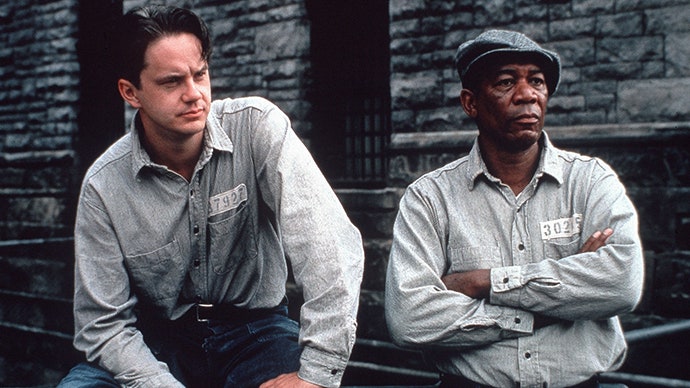
| 23. | GONE WITH THE WIND Screenplay by Sidney Howard. Based on the novel by Margaret Mitchell |
| 24. | ETERNAL SUNSHINE OF THE SPOTLESS MIND Screenplay by Charlie Kaufman. Story by Charlie Kaufman & Michel Gondry & Pierre Bismuth |
| 25. | THE WIZARD OF OZ Screenplay by Noel Langley and Florence Ryerson and Edgar Allan Woolf Adaptation by Noel Langley. Based on the novel by L. Frank Baum |
| 26. | DOUBLE INDEMNITY Screenplay by Billy Wilder and Raymond Chandler. Based on the novel by James M. Cain |
| 27. | GROUNDHOG DAY Screenplay by Danny Rubin and Harold Ramis. Story by Danny Rubin |
| 28. | SHAKESPEARE IN LOVE Written by Marc Norman and Tom Stoppard |
| 29. | SULLIVAN’S TRAVELS Written by Preston Sturges |
| 30. | UNFORGIVEN Written by David Webb Peoples |
| 31. | HIS GIRL FRIDAY Screenplay by Charles Lederer. Based on the play “The Front Page” by Ben Hecht & Charles MacArthur |
| 32. | FARGO Written by Joel Coen & Ethan Coen |
| 33. | THE THIRD MAN Screenplay by Graham Greene. Story by Graham Greene. Based on the short story by Graham Greene |
| 34. | THE SWEET SMELL OF SUCCESS Screenplay by Clifford Odets and Ernest Lehman. From a novelette by Ernest Lehman |
| 35. | THE USUAL SUSPECTS Written by Christopher McQuarrie |
| 36. | MIDNIGHT COWBOY Screenplay by Waldo Salt. Based on the novel by James Leo Herlihy |
| 37. | THE PHILADELPHIA STORY Screenplay by Donald Ogden Stewart. Based on the play by Philip Barry |
| 38. | AMERICAN BEAUTY Written by Alan Ball |
| 39. | THE STING Written by David S. Ward |
| 40. | WHEN HARRY MET SALLY Written by Nora Ephron |
| 41. | GOODFELLAS Screenplay by Nicholas Pileggi & Martin Scorsese. Based on book “Wise Guy” by Nicholas Pileggi |
| 42. | RAIDERS OF THE LOST ARK Screenplay by Lawrence Kasdan. Story by George Lucas and Philip Kaufman |
| 43. | TAXI DRIVER Written by Paul Schrader |
| 44. | THE BEST YEARS OF OUR LIVES Screenplay by Robert E. Sherwood. Based on novel “Glory For Me” by MacKinley Kantor |
| 45. | ONE FLEW OVER THE CUCKOO’S NEST Screenplay by Lawrence Hauben and Bo Goldman. Based on the novel by Ken Kesey |
| 46. | THE TREASURE OF THE SIERRA MADRE Screenplay by John Huston. Based on the novel by B. Traven |
| 47. | THE MALTESE FALCON Screenplay by John Huston. Based on the novel by Dashiell Hammett |
| 48. | THE BRIDGE ON THE RIVER KWAI Screenplay by Carl Foreman and Michael Wilson. Based on the novel by Pierre Boulle |
| 49. | SCHINDLER’S LIST Screenplay by Steven Zaillian. Based on the novel by Thomas Keneally |
| 50. | THE SIXTH SENSE Written by M. Night Shyamalan |
| 51. | BROADCAST NEWS Written by James L. Brooks |
| 52. | THE LADY EVE Screenplay by Preston Sturges. Story by Monckton Hoffe |
| 53. | ALL THE PRESIDENT’S MEN Screenplay by William Goldman. Based on the book by Carl Bernstein & Bob Woodward |
| 54. | MANHATTAN Written by Woody Allen & Marshall Brickman |
| 55. | APOCALYPSE NOW Written by John Milius and Francis Coppola. Narration by Michael Herr |
| 56. | BACK TO THE FUTURE Written by Robert Zemeckis & Bob Gale |
| 57. | CRIMES AND MISDEMEANORS Written by Woody Allen |
| 58. | ORDINARY PEOPLE Screenplay by Alvin Sargent. Based on the novel by Judith Guest |
| 59. | IT HAPPENED ONE NIGHT Screenplay by Robert Riskin. Based on the story “Night Bus” by Samuel Hopkins Adams |
| 60. | L.A. CONFIDENTIAL Screenplay by Brian Helgeland & Curtis Hanson. Based on the novel by James Ellroy |
| 61. | THE SILENCE OF THE LAMBS Screenplay by Ted Tally. Based on the novel by Thomas Harris |
| 62. | MOONSTRUCK Written by John Patrick Shanley |
| 63. | JAWS Screenplay by Peter Benchley and Carl Gottlieb. Based on the novel by Peter Benchley |
| 64. | TERMS OF ENDEARMENT Screenplay by James L. Brooks. Based on the novel by Larry McMurtry |
| 65. | SINGIN’ IN THE RAIN Screen Story and Screenplay by Betty Comden & Adolph Green. Based on the song by Arthur Freed and Nacio Herb Brown |
| 66. | JERRY MAGUIRE Written by Cameron Crowe |
| 67. | E.T. THE EXTRA-TERRESTRIAL Written by Melissa Mathison |
| 68. | STAR WARS Written by George Lucas |
| 69. | DOG DAY AFTERNOON Screenplay by Frank Pierson. Based on a magazine article by P.F. Kluge and Thomas Moore |
| 70. | THE AFRICAN QUEEN Screenplay by James Agee and John Huston. Based on the novel by C.S. Forester |
| 71. | THE LION IN WINTER Screenplay by James Goldman. Based on the play by James Goldman |
| 72. | THELMA & LOUISE Written by Callie Khouri |
| 73. | AMADEUS Screenplay by Peter Shaffer. Based on his play |
| 74. | BEING JOHN MALKOVICH Written by Charlie Kaufman |
| 75. | HIGH NOON Screenplay by Carl Foreman. Based on short story “The Tin Star” by John W. Cunningham |
| 76. | RAGING BULL Screenplay by Paul Schrader and Mardik Martin. Based on the book by Jake La Motta with Joseph Carter and Peter Savage |
| 77. | ADAPTATION Screenplay by Charlie Kaufman and Donald Kaufman. Based on the book “The Orchid Thief” by Susan Orlean |
| 78. | ROCKY Written by Sylvester Stallone |
| 79. | THE PRODUCERS Written by Mel Brooks |
| 80. | WITNESS Screenplay by Earl W. Wallace & William Kelley. Story by William Kelley and Pamela Wallace & Earl W. Wallace |
| 81. | BEING THERE Screenplay by Jerzy Kosinski. Inspired by the novel by Jerzy Kosinski |
| 82. | COOL HAND LUKE Screenplay by Donn Pearce and Frank Pierson. Based on the novel by Donn Pearce |
| 83. | REAR WINDOW Screenplay by John Michael Hayes. Based on the short story by Cornell Woolrich |
| 84. | THE PRINCESS BRIDE Screenplay by William Goldman. Based on his novel |
| 85. | LA GRANDE ILLUSION Written by Jean Renoir and Charles Spaak |
| 86. | HAROLD & MAUDE Written by Colin Higgins |
| 87. | 8 1/2 Screenplay by Federico Fellini, Tullio Pinelli, Ennio Flaiano, Brunello Rond. Story by Fellini, Flaiano |
| 88. | FIELD OF DREAMS Screenplay by Phil Alden Robinson. Based on the book by W.P. Kinsella |
| 89. | FORREST GUMP Screenplay by Eric Roth. Based on the novel by Winston Groom |
| 90. | SIDEWAYS Screenplay by Alexander Payne & Jim Taylor. Based on the novel by Rex Pickett |
| 91. | THE VERDICT Screenplay by David Mamet. Based on the novel by Barry Reed |
| 92. | PSYCHO Screenplay by Joseph Stefano. Based on the novel by Robert Bloch |
| 93. | DO THE RIGHT THING Written by Spike Lee |
| 94. | PATTON Screen Story and Screenplay by Francis Ford Coppola and Edmund H. North. Based on “A Soldier’s Story” by Omar H. Bradley and “Patton: Ordeal and Triumph” by Ladislas Farago |
| 95. | HANNAH AND HER SISTERS Written by Woody Allen |
| 96. | THE HUSTLER Screenplay by Sidney Carroll & Robert Rossen. Based on the novel by Walter Tevis |
| 97. | THE SEARCHERS Screenplay by Frank S. Nugent. Based on the novel by Alan Le May |
| 98. | THE GRAPES OF WRATH Screenplay by Nunnally Johnson. Based on the novel by John Steinbeck |
| 99. | THE WILD BUNCH Screenplay by Walon Green and Sam Peckinpah. Story by Walon Green and Roy Sickner |
| 100. | MEMENTO Screenplay by Christopher Nolan. Based on the short story “Memento Mori” by Jonathan Nolan |
| 101. | NOTORIOUS Written by Ben Hecht |
The 101 Greatest Screenplays of the 21st Century (So Far)
Fifteen years later, the WGA released a second list: the 101 Greatest Screenplays of the 21st Century (*so far). This latest list featured a diverse array of writers as well as translations of foreign language screenplays such as:
- City of God (2002), written by Bráulio Mantovani
- Spirited Away (2001), written by Hayao Miyazaki
- Roma (2018), written by Alfonso Cuarón
Get Out (2017) topped the list, one that also included the works of acclaimed screenwriters such as:
- The Coen Brothers
- Paul Thomas Anderson
- Quentin Tarantino
- Aaron Sorkin
- Greta Gerwig
- Diablo Cody
- Pete Docter
- Brad Bird
Using both these lists for inspiration, let’s examine a handful of screenplays and explore the characteristics that make them so revered.
What Makes A “Best Ever” Screenplay? An Analysis:
#24. Eternal Sunshine of the Spotless Mind (2004)
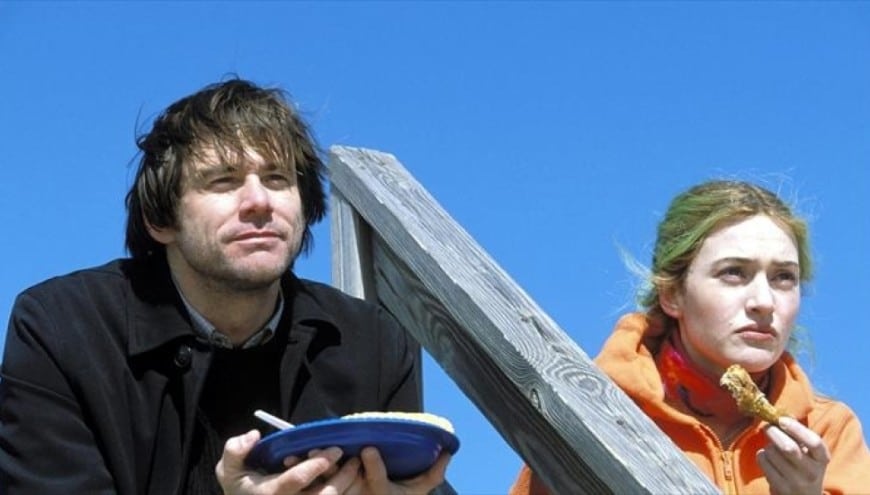
Sticking broadly to the list of attributes as set out at the beginning of the article, let’s start by looking at a fantastic high-concept screenplay: Eternal Sunshine of the Spotless Mind. But first, what do we mean by ‘high concept’?
A high concept is a captivating premise for a movie that generates audience appeal without attached elements, such as critic reviews or casting.
So what makes Eternal Sunshine of the Spotless Mind a high-concept film? The story began with an abstract thought experiment: what if a person were to receive a postcard telling them that they had been erased from someone else’s memory?
Kaufman’s screenplay revolves around this central idea: the premise infuses the story, informing the plot and motivating the characters. The primary purpose of the narrative is to explore the emotional and ethical consequences of the decision to wilfully repress – or obliterate – one’s memories.
But one of the (many) reasons for Eternal Sunshine’s success is the fact that the high-concept premise doesn’t overwhelm the narrative.
- Kaufman avoids the common pitfall – of having a bloated concept and barebones characters – by constructing credible character relationships.
- Kaufman’s characters are fully formed and compelling. They are complex and contradictory – alternately abrasive and tender, cynical and vulnerable – which lends them a multifaceted authenticity.
- The characters explore the premise without becoming subservient to it.
Eternal Sunshine deserves praise for its meticulous, non-linear structure, its excellent dialogue, and its use of side characters and subplots to further develop its premise.
The screenplay’s crowning achievement, however, is its unwavering commitment to telling a touching and distinctly human story. In spite of its high-concept premise and abstract sequences, Kaufman’s screenplay is rooted in the humanity of its themes: love and loss, acceptance and regret, fate and freedom.
#1. Casablanca (1942)
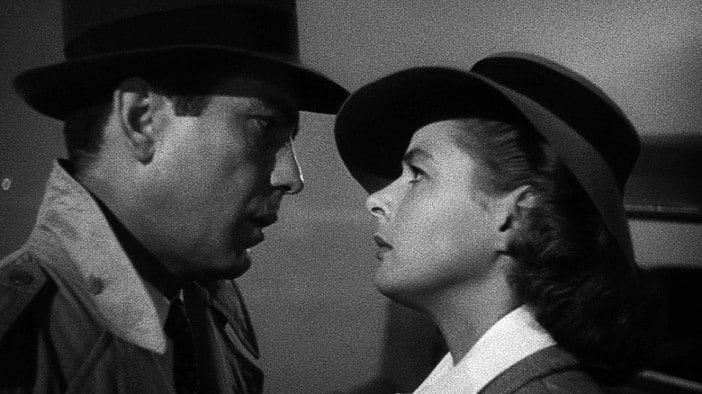
Next up, let’s look at a revered classic: Michael Curtiz’s beloved wartime romance Casablanca. As with any other screenplay on this list, there’s far more to be praised than can be covered in so few words. So let’s narrow our focus and examine Casablanca in regard to its use of conflict.
The story is that of Rick Blaine, a cynical expatriate in French-occupied Morocco during the Second World War. Prompted by the arrival of his former lover and her fugitive husband, Rick considers helping the couple escape the Nazis.
As we can see, the premise of the story is wrought with conflict. Set during the Second World War, the story is inherently imbued with a sense of urgency and the threat of violence. We can see this tension in the opening pages of the script, which contains shots of sudden panic and brutality:
“women run screaming”; “[police offers] dragging frightened refugees”; “the shadow of a man hanging by a rope”
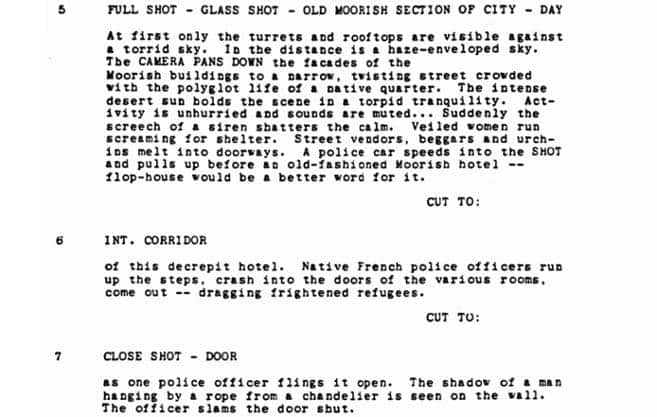
The external conflict intrinsic to the setting is further complemented by the internal conflict of the protagonist.
Rick’s Internal Conflict
Rick tussles with several contradictions and competing motivations.
- For instance, he is outwardly cynical yet deeply compassionate. Despite being impartial to the conflict (his nightclub, Rick’s Café Américain, is open to all), he resents the German repression.
- Rick finds his position further complicated by the arrival of Ilsa and Laszlo, who are trying to escape Casablanca.
- As Rick’s former lover, Ilsa introduces a degree of emotional uncertainty. Will Rick help or hinder the couple’s goals?
- Additionally, Laszlo’s position as a prominent figure in the Resistance movement creates further complexity. Any action that Rick chooses to take now has broader political implications. As such, Rick’s dilemma is both intensely personal and acutely political.
Ilsa and Laszlo are catalysts, spurring Rick into action and prompting him to abandon his neutrality. Rick subsequently chooses to assist the couple – even to his detriment – in a series of gestures that demonstrate the triumph of moral duty over self-interest. This completes Rick’s character arc: moving from cynical indifference to decisive action.
#11. Butch Cassidy and the Sundance Kid (1969)
Another screenplay with great characterisation is the 1969 western, Butch Cassidy and the Sundance Kid.
The story is a loose dramatization of the real bandits’ lives and the fall of their criminal gang. It follows Butch and Sundance as they take on a string of robberies, quickly gaining notoriety and becoming hunted by a relentless posse of lawmen before attempting to adopt new lives in South America.
Goldman’s principal characters, rather than being conventional, stoic gunslingers, are instead charming and fallible, matching quick wits with a capacity for vulnerability.
What’s more, the screenplay is also frequently funny, often indulging in comedic sequences and sharp exchanges to reflect the carefree levity of its characters’ dispositions.
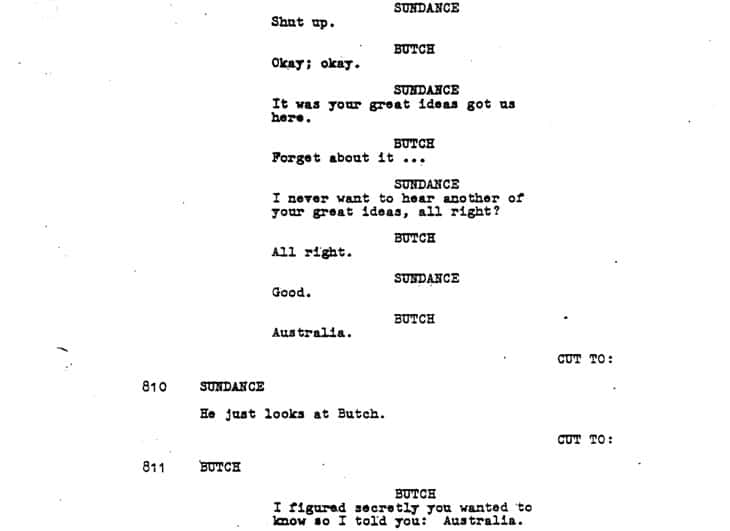
In contrast to this spirit of optimism, the screenplay carries a disempowering sense of fatalistic foreboding.
On the run from the mysterious super-posse, Butch and Sundance spend the majority of the narrative only narrowly evading the long arm of the law, and – coming within a hair’s breadth of a fresh start – learn too late that they can escape neither their nefarious pasts nor their very natures.
Here, Goldman’s screenplay should also be commended for its approach to the genre. The cathartic violence often found at the climax of traditional westerns is notably absent. Lethal violence occurs only sporadically throughout the screenplay and becomes an ugly, shocking thing devoid of satisfaction.
This is particularly apparent during the scene in which Butch and Sundance, whilst working as payroll guards, are confronted by bandits. Unable to de-escalate the situation and yet desperate to avoid violence – “Please go. Please. Por favor” – a reluctant bloodbath ensues.
The violence is drawn-out and depicted in harrowing detail. Ultimately, there is nothing heroic about it. Consequently, it subverts the genre and delivers a powerful message on the nature of violence, heroes and folklore.
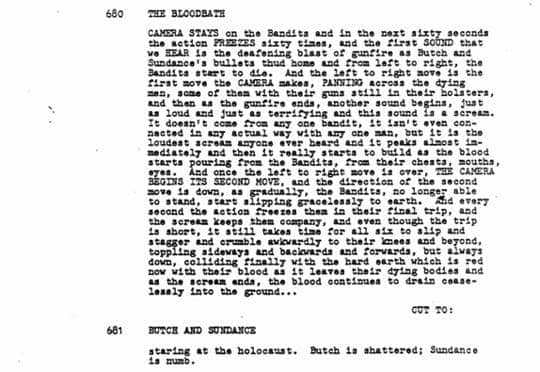
#3. Chinatown (1974)
Robert Towne’s Chinatown, is another screenplay that comes close to taking the title of ‘Greatest Screenplay Ever Written’. Let’s focus particularly on visual motifs and thematic foreshadowing.
Chinatown is a neo-noir detective mystery centring on Jake Gittes, a private detective hired to investigate a case of suspected infidelity. Before long, however, the case takes an unexpected turn and Jake becomes embroiled in the murky waters of political corruption and murder.
In his 1979 book ‘Screenplay: The Foundations of Screenwriting’, Syd Field writes at length about the tight three-act structure of Chinatown, commending Towne’s expert use of plot points to maintain a structurally cohesive narrative.
- A plot point, as Field explains, is an event that “spins the action around, shifts it into another direction”, and thereby ensures that a story continues to develop toward its natural conclusion.
Field also praises Chinatown’s screenplay for the introduction of its themes.
- As Field observes, the core concept of “money, power, and influence being a corruptive force” is established as early as page three, in a moment in which Gittes chastises Curly for his naivety:
“You gotta be rich to kill somebody, anybody, and get away with it.”
Gittes’ naivety is also on display. His confession to Evelyn – “I thought I was keeping someone from being hurt and actually I ended up making sure they were hurt” – preempts the tragic conclusion at the story’s end.
Gitte’s journey is one of cyclical futility: the same mistake brings about the same fate. Consequently, the screenplay ends with an uncomfortable disjunction between truth and justice.
#1. Get Out (2017)
Leaping forward to the 2010s, another fantastic screenplay worth analyzing is writer-director Jordan Peele’s Get Out. In this section, we’ll discuss the social themes raised in the screenplay as well as its use of symbolism.
Described by Peele as a “social thriller”, Get Out is a psychological horror film about Chris, a young African-American man, meeting the liberal family of his white girlfriend, Rose.
- Already imbued with implicit tension, our expectations of the encounter are subverted by the family’s ostensibly warm reception of Chris.
- However, the family’s hospitality is overly-accommodating and artificial, heightening the tension. The sense of insinuated threat is further compounded by the family’s eerie fascination with Chris’ race.
This sinister fixation develops as the story progresses and the Armitage family reveal their true intentions. Chris is one of many black men and women who are abducted by the family, and whose bodies are used to house the minds and souls of rich, white patrons.
Consequently, it becomes clear that this fetishization of the black body – “black is ‘in fashion!’” – is another form of subjugation. It masks a desire to control, and the result – the erasure of black identity – is as detrimental as overt racism.
“we don’t hate you […] we want to be you”
Peele masterfully uses tension to lure the audience into the movie’s thematic subtext. We, from the very start, suspect something is off about this dynamic. The language of cinema is used to both play on and subvert our expectations.
Symbolism
Another factor that makes Peele’s screenplay so highly regarded is its use of symbolism. One prominent example is the motif of a deer, which reoccurs throughout and is representative of Chris’ identity.
The scene in which Rose (Chris’ girlfriend) hits a deer with her car, for instance, is symbolically significant.
- For one, the incident anticipates Rose’s duplicity and her disregard for Chris.
- Secondly, the deer later becomes associated with Chris’ mother, who similarly died in a car accident.
- Another example is the decaying “antlered thing” in the Sunken Place. The creature signifies the existential threat to Chris’ identity and the purgatorial state that awaits him. As a visual metaphor, it states that Chris – in his subdued state of hypnosis – will become neither living nor dead.
- The stag’s head, mounted in the games room, also plays an important role, again alluding to Chris’ fate (taxidermy being the false visage of life) and later becoming instrumental to his escape.
- Lastly, Walter’s moment of lucidity – freed from his stupor by the flash of Chris’ phone – is accompanied by a “pained moan reminiscent of the deer’s”, showing Walter’s return to consciousness and the restoration of his bodily autonomy.
Get Out is ultimately a film acutely aware of its cinematic language. It’s one of the main reasons that the script is so highly regarded and easy to see, therefore, why it places at the list’s summit.
– What did you think of this article? Share It, Like It, give it a rating, and let us know your thoughts in the comments box further down…
– Struggling with a script or book? Story analysis is what we do, all day, every day… check out our range of script coverage services for writers & filmmakers.
This article was written by Joe Davidson and edited by IS Staff.
Get *ALL* our FREE Resources
Tackle the trickiest areas of screenwriting with our exclusive eBooks. Get all our FREE resources when you join 60,000 filmmakers on our mailing list!


Chinatown beats Casablanca any day!
Enjoyed and agree with the choice of scripts. Also enjoyed the succinct and clear analysis of why they are great.